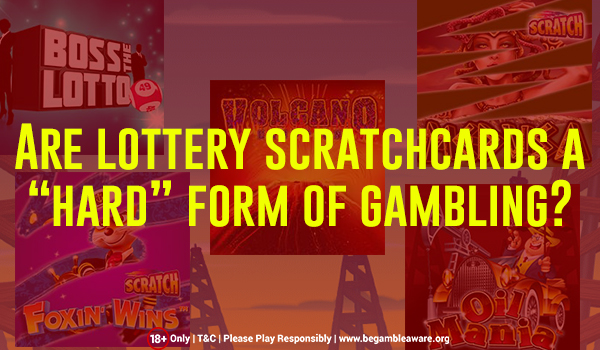The concept of scratch cards was first introduced to the United Kingdom on 21st March 1995 by a consortium that runs the UK National Lottery. The National Lottery Charities Board confirmed that this concept had been introduced to contribute to charity in the UK. People came to know about this concept through heavy advertising such as TV, billboards, etc. Many people consider the concept of scratch cards to be one of the easiest ways to make money. They may start buying the cards initially for fun. But, with time, they tend to get addicted and lose their ability to bear losses.

Therefore, scratch cards are a solid form of gambling. They can also be considered potentially addictive since this form of gambling tends to become a repetitive habit due to different factors such as:
- Rapid, even frequency
- Conditioning effects
- Psychological rewards
- Short payout intervals
Most importantly, this form of gambling is also deceptively inexpensive. You may think scratch cards are reasonable, but at the end of the day, you may have to spend a huge amount of money. Let’s check out how the factors mentioned above confirm that scratch cards are a hard form of gambling.
Why Are Scratch Cards Considered a Hard Form of Gambling?
According to a report by the Royal Commission, casino-type gambling activities brought forth a slew of characteristics such as:
- High payout ratio (Large jackpots and small bets)
- Rapid event frequency
Scratch cards consist of all the two characteristics, and they allow continuous gambling to a lot of people. Gamblers may go on investing money in the cards in an attempt to make money. But, there isn’t any guarantee, is there? Scratch cards can lead to heavy losses from a psychological point of view due to many reasons. Let’s have a look.
Short Payout Intervals
As a matter of fact, scratch cards consist of short payout intervals. That means there are only a few intervals of seconds that separates the initial gamble and winning payments. The next factor is rapid event frequency, which is the gap of time between each gamble. In the case of a scratch card, people will have a short interval of time between each gamble if you engage in continuous play. In such a brief time, you may not have enough time for financial considerations.
Frequency of Playing
Some gambling activities such as the Football pools and UK National Lottery encompass small event frequencies. Thus, you can enjoy two to three draws a week. Therefore, it is considered as a soft form of gambling. Scratch cards, on the other hand, have limited or no restrictions as such. In the case of gambling, limits are set only based on how fast a person could scratch off the cover of winning or losing symbols.
Operant Conditioning Process
In the case of scratch cards, the result of the gamble and the time till you receive the winnings define certain psychological principles of learning. This is known as the operant conditioning process which rewards people for specific behaviour. As mentioned before, scratch cards are available in rapid frequencies, and promoters pay out winnings as quickly as possible to gain high rates of response from the gamblers. The monetary rewards in the gambling industry are seen as an extrinsic reward for winners.
Chances of Near Winning
The thing about scratch cards is that they lead to near chances of winning and losing. Gamblers fail to understand that near misses are also failures. They continue playing just at the thought of making it big this time. Continuous gambling usually leads to high chances of near misses and that too at short intervals of time. No wonder psychologists render this form of gambling’ heartstoppers.’ It is because scratch cards give the illusion of a big prize to the people.
Endnote
Apart from the problems mentioned above, scratch cards are easily available to children and adolescents in the market. Therefore, it is easier for them to start gambling at a tender age. Some rules should be laid out to help everyone control their gambling activities and encourage them to indulge in it as long as they don’t get on the ‘hard’ side of gambling.
Author: Richard
Posted On: 24/09/2019
-
Roulette Vs Poker: Which One Gets the Tight Hold of the Crown?
You might be among the newcomers who have gained enough interest to get ...
-
Blackjack and Deck Penetration: A Secret to Card Counting
Blackjack is one of the most popular games among the gamblers who love t ...
-
Evolution of Live Casino: Everything You Need to Know
Imagine bei ...
